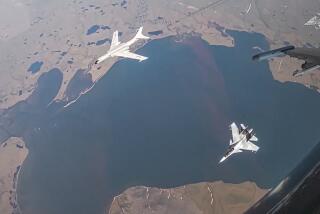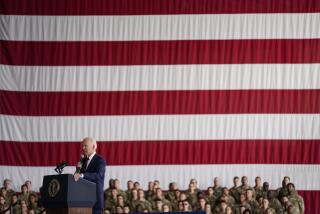Bush Starts Asia Trip, Sees It as Way to Boost U.S. Role
- Share via
TOKYO — President Bush arrived in Tokyo today to attend the funeral of Emperor Hirohito and begin a six-day tour of East Asia aimed at demonstrating U.S. intentions to remain a Pacific power at a time of increased Soviet activity and shifting diplomatic currents throughout the region.
After making a brief stopover in Anchorage, Alaska, Air Force One touched down at Tokyo’s Haneda Airport at 1:05 p.m. local time (8:05 p.m. Wednesday PST), and the President traveled by motorcade to the U.S. ambassador’s residence, where he was to meet French President Francois Mitterand over lunch.
Bush was scheduled to meet Japanese Prime Minister Noboru Takeshita later in the afternoon and, in addition to attending the imperial funeral Friday, hold a series of private meetings with other world leaders and receive an audience with Emperor Akihito before leaving Tokyo for Beijing on Saturday.
In remarks made in Anchorage en route, Bush stressed the strength of U.S. ties in Asia, but he also gently prodded Japan to play a greater role in the common defense of the Far East, and pointedly ignored a celebration of U.S.- Soviet neighborliness taking place in Alaska.
The trip to Japan, China and South Korea was planned around the funeral Friday morning of Hirohito, the last of the World War II leaders, whose rites and burial are bringing representatives of 159 nations, including about 60 heads of government or state, to Tokyo.
But it also provides the President an opportunity in the early days of his Administration “to reaffirm that the United States plans to play a strong and affirmative role as an Asian power” and that its influence in the region is not declining, said Brent Scowcroft, Bush’s national security adviser.
Bush, speaking to Alaskans assembled in a massive hangar at Elmendorf Air Force Base in Anchorage while Air Force One was refueled nearby, said that even as the United States reviews its relations with the Soviets, in the Middle East and in Latin America, “We don’t ever want to take our friends for granted, be they China, be they Japan, be they Korea.
“Yes, things in the Pacific seem to be going reasonably well,” said the President, who is being accompanied on the trip by his wife, Barbara. “But we are a Pacific power, and this visit will demonstrate that we intend to stay a Pacific power.”
In the U.S.-Chinese relationship, he said: “There is something more than symbolism. That relationship is fundamental in any foreign policy equation of the United States.
“Alaskans understand that America is as much a Pacific nation as it is an Atlantic one--and that the Pacific region is of great and growing importance in international affairs,” he said.
Saluting the strength of the U.S. relationship with all three countries he will visit before returning to Washington on Monday, Bush said he seeks by his trip to Tokyo to show his respect for Japan as “a valued ally and a fellow democracy.”
However, in other remarks, there was a hint of the undercurrent of tension that often marks U.S.-Japanese relations.
In written answers provided to questions submitted by the Kyodo News Service of Japan, the President acknowledged “Japan’s continued and steady progress in improving its defense capability,” long a point of prodding by the United States. But he offered the reminder that “there is still room for greater improvement, especially in the area of sustainability”--the crucial military ability to maintain long supply lines from home bases to units operating in the field or, in the case of Japan, at sea.
Scowcroft told reporters Tuesday that in the meetings with Prime Minister Takeshita, Bush would raise the question of how Japan can increase its contribution, “whether it’s through their own defense expenditures, whether it’s through helping mutual allies with security.”
The new national security adviser accompanied the President, along with Secretary of State James A. Baker III.
In his Anchorage remarks, Bush said that in China, he hopes “to build on the friendly, stable and enduring relationship that now exists.”
He described South Korea as a nation “where democratic institutions are gaining strength each day.”
“At each stop, I aim to strengthen key relationships with our friends and partners in the Pacific region,” the President said.
In at least one respect, however, the Bush Administration has been moving slowly to develop its ties to the region: The President has yet to formally send to the Senate his nominations of U.S. ambassadors to Japan, China and South Korea.
In his speech, Bush made no reference to the evolving Soviet interest in the Pacific, or to the emerging contacts between Alaskans and residents of the Soviet Far East across the narrow Bering Strait.
Rather, in a message directed to the sizable contingent of U.S. military forces stationed in the far north, he said:
“Make no mistake about it--the importance of your task. Alaska’s strategic position--at the point where the Far East, the Western Hemisphere and the Arctic meet, is proof enough that the missions you perform here are vital to our national security.
“You are the forward edge, the cutting edge, if you will, of our national defense. We rely on you to keep the watch, to hold the line,” he said.
As a sentry along the polar approach to the rest of the United States, Alaska is home to Air Force, Navy and Army bases, whose missions include continental defenses against bombers, anti-submarine warfare and the monitoring of Soviet and Chinese communications.
Soviet Visitors
Even as Bush paid his 90-minute visit to Alaska at the midpoint of his 15-hour, 7,050-mile journey from Washington to Tokyo, 90 Soviet visitors were paying a weeklong visit, staying in local homes, fielding questions at public schools and celebrating the more open borders in a region of the world where distrust and hostility had reigned.
White House officials said the center of the activities was too far away to allow Bush to take part during his brief stop.
For more than two years, U.S. officials have been watching with interest as the Soviets have paid ever greater attention to the Pacific, beginning with a speech Soviet President Mikhail S. Gorbachev delivered in July, 1986, in Vladivostok--a city situated on the Sea of Japan. At that time, he touted the “considerable opportunities . . . in the Far East and in the Pacific” for “peaceful, good neighborly relations and for mutually beneficial cooperation.”
Since then, the Soviet withdrawal from Afghanistan and efforts to pull troops of its ally Vietnam out of Cambodia have led to a sharp improvement in Sino-Soviet relations and the announcement in early February that Gorbachev would visit Beijing, probably in mid-May.
The prospects of the Sino-Soviet summit loom large in the politics of the region, just as the start of the Bush Administration has left Asians curious about the future of U.S. policies.
The President’s decision to visit China before Gorbachev gets there, said one U.S. official, demonstrates to the Chinese “that the American commitment is real.”
“They’re trying to feel Bush out. The Chinese don’t have a very good feel for these (new) people,” said the official, speaking on the condition of anonymity.
More to Read
Sign up for Essential California
The most important California stories and recommendations in your inbox every morning.
You may occasionally receive promotional content from the Los Angeles Times.












